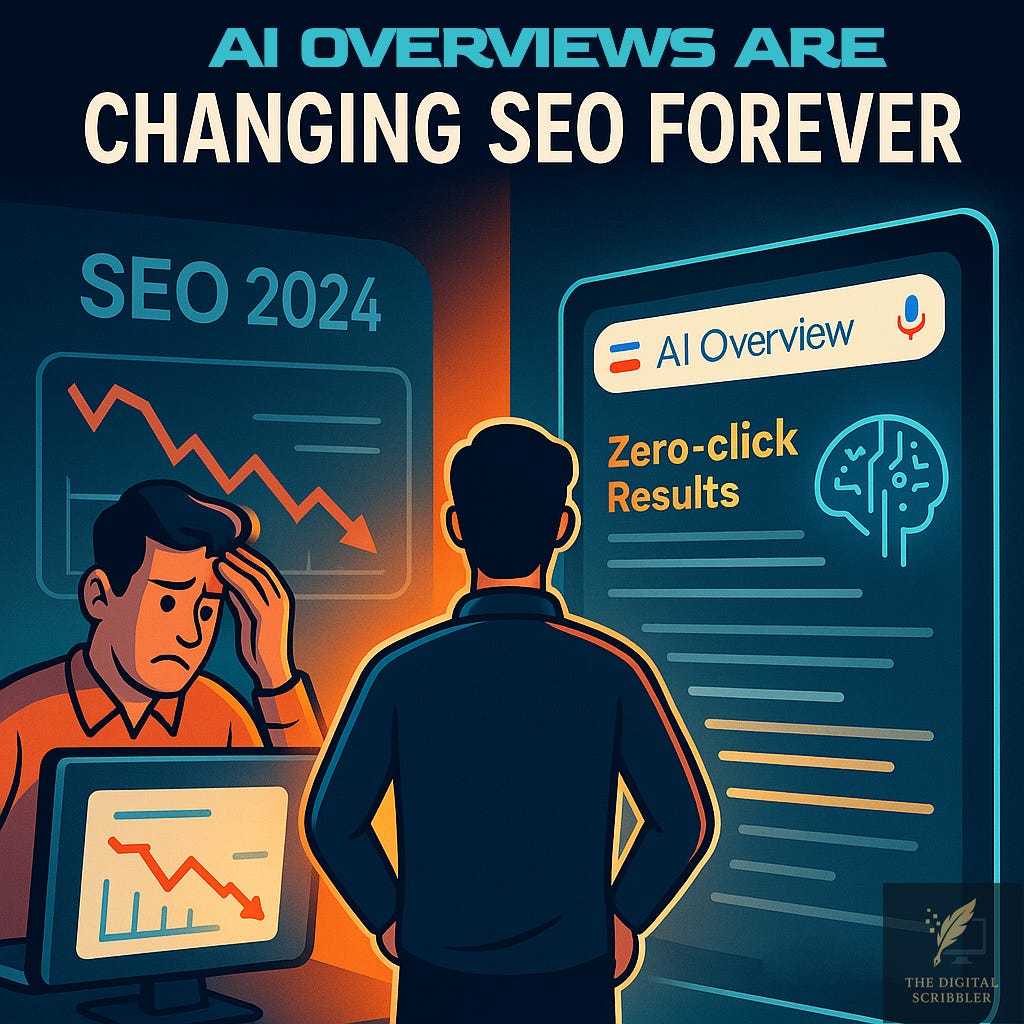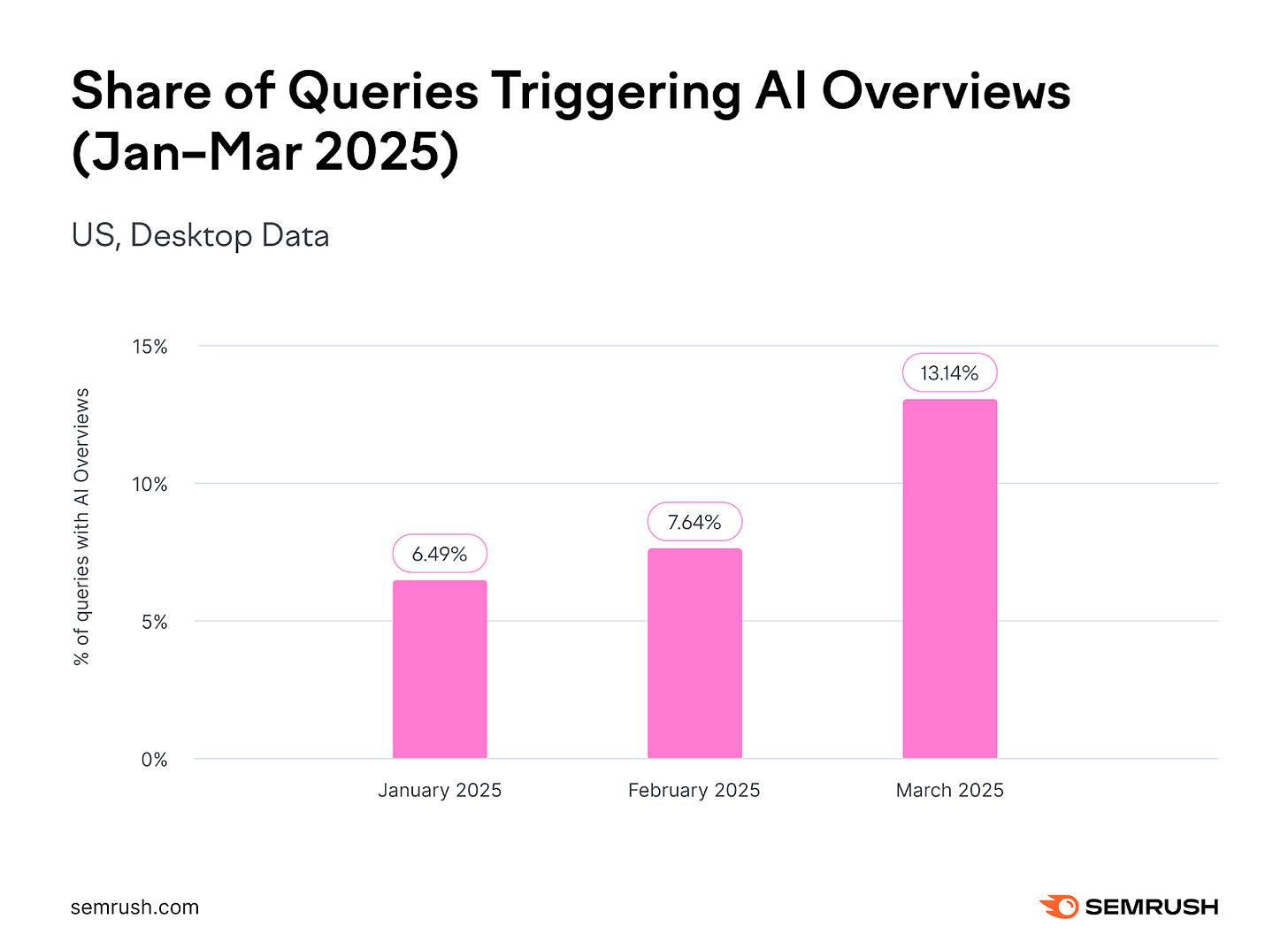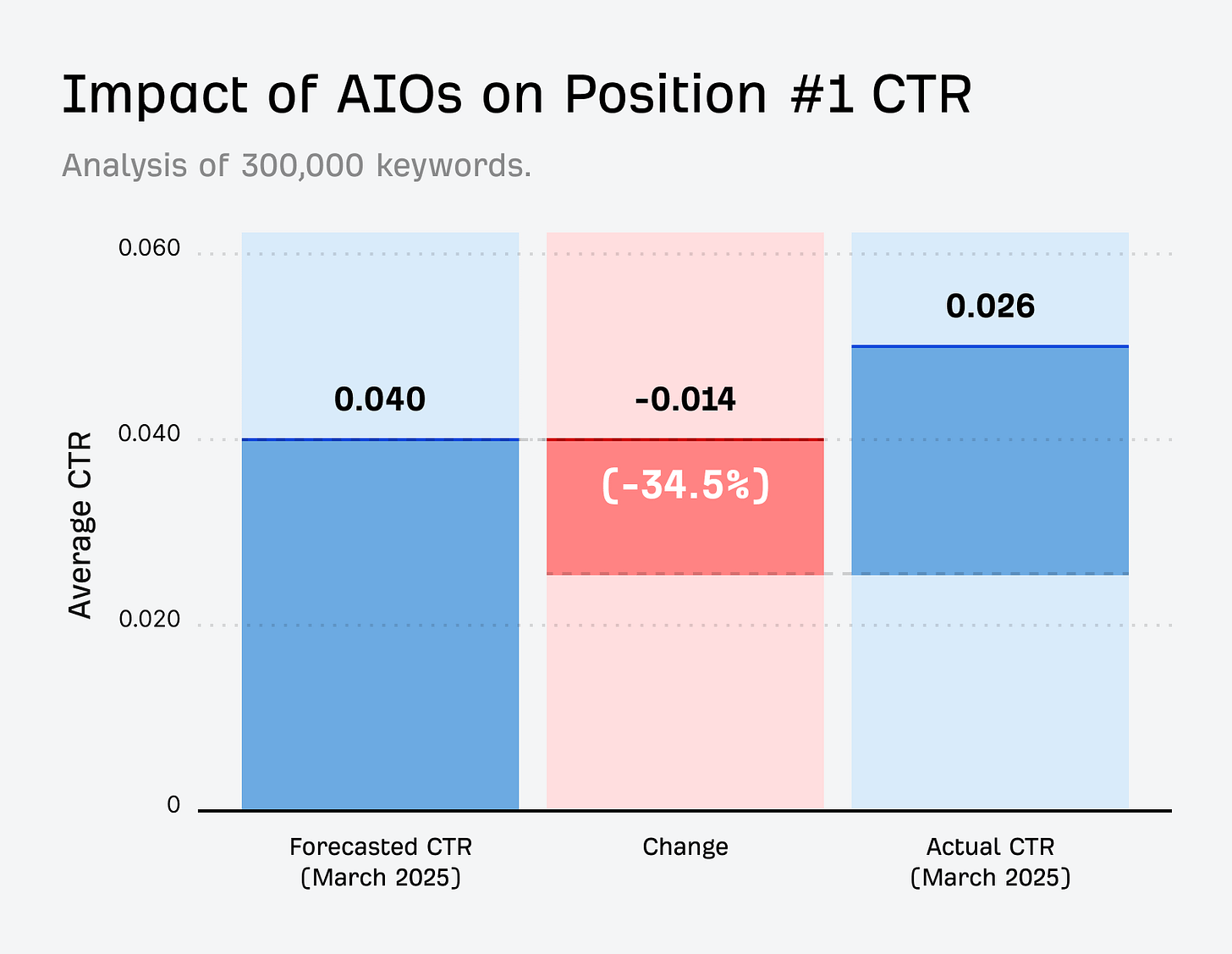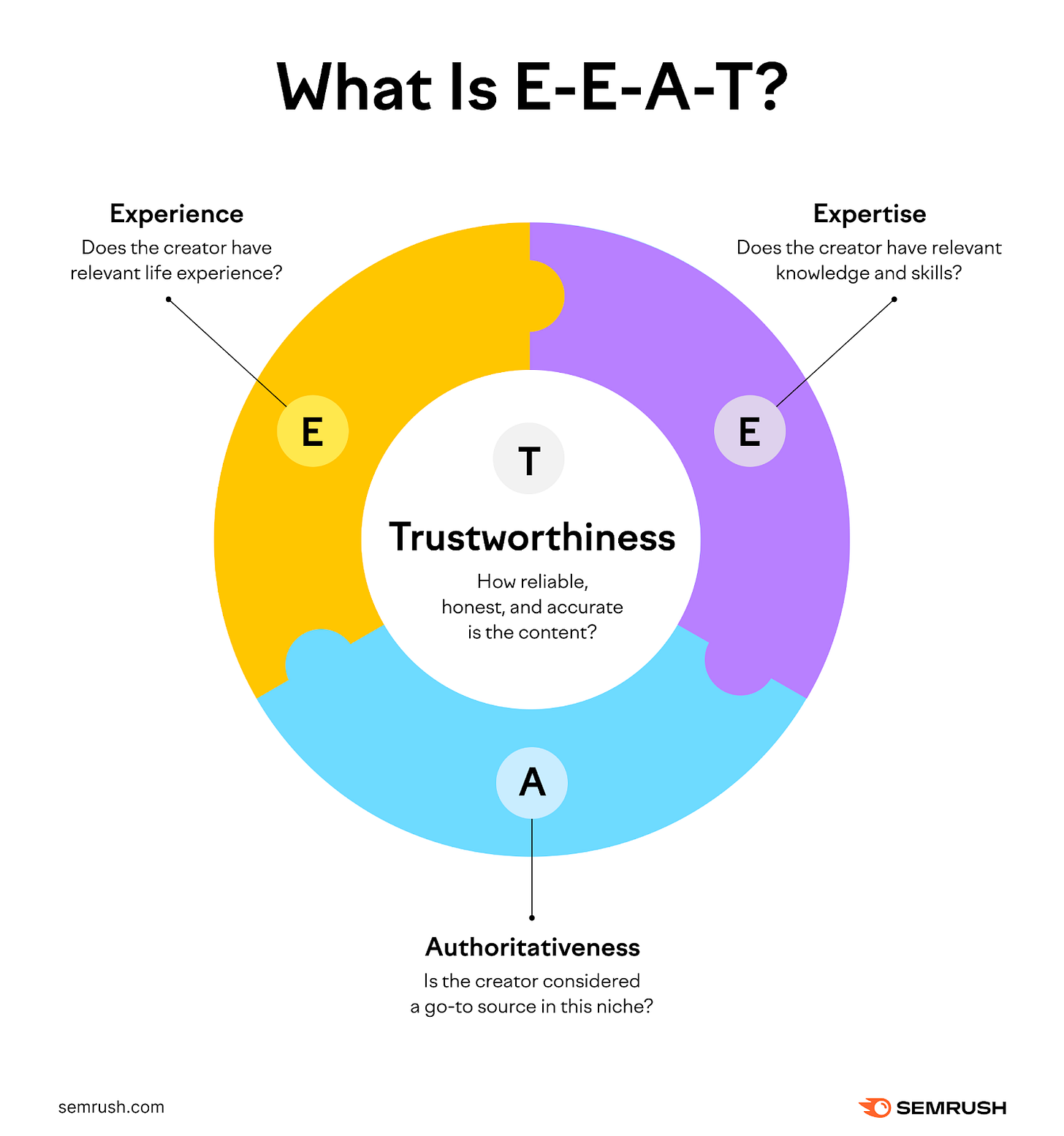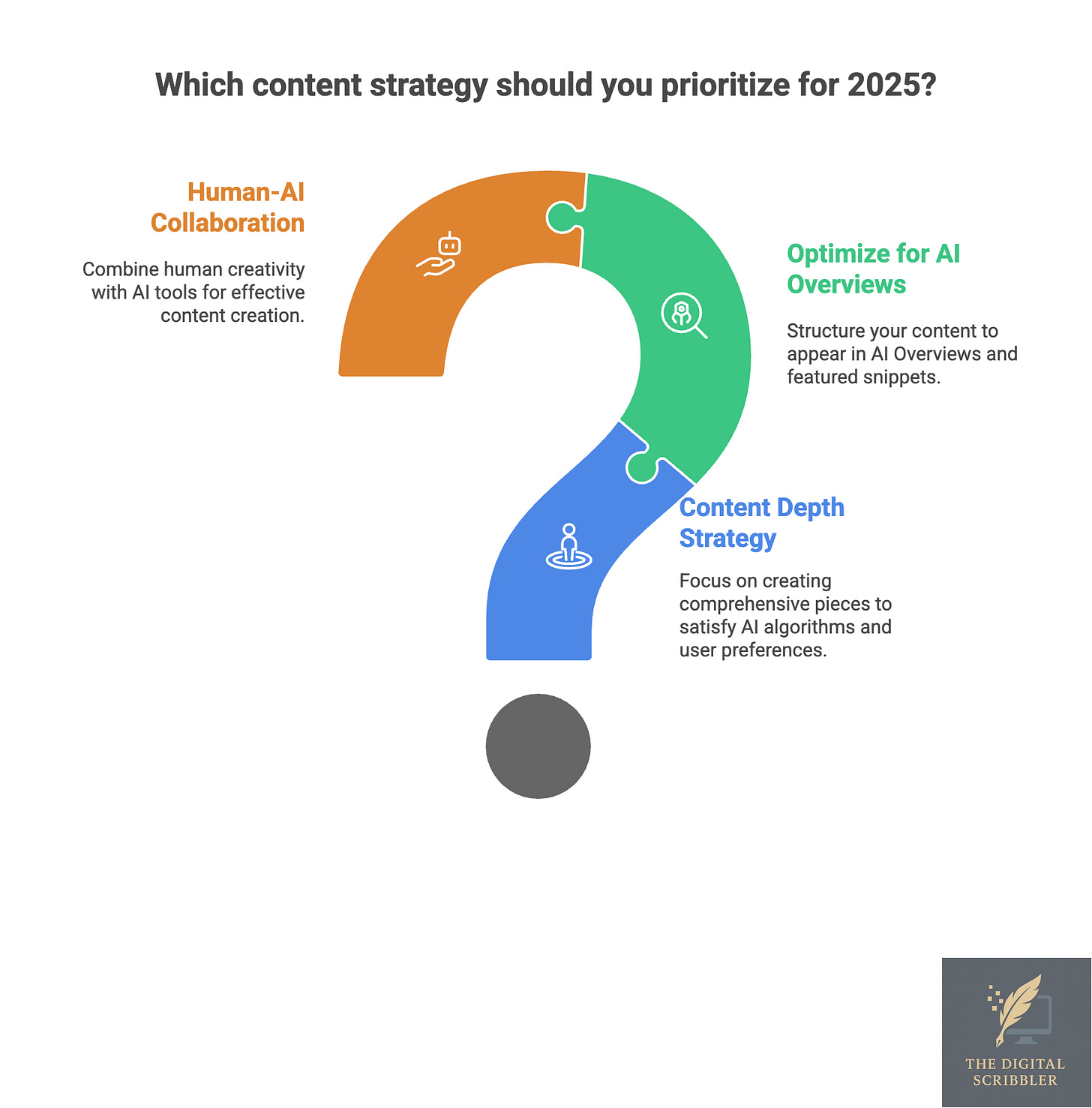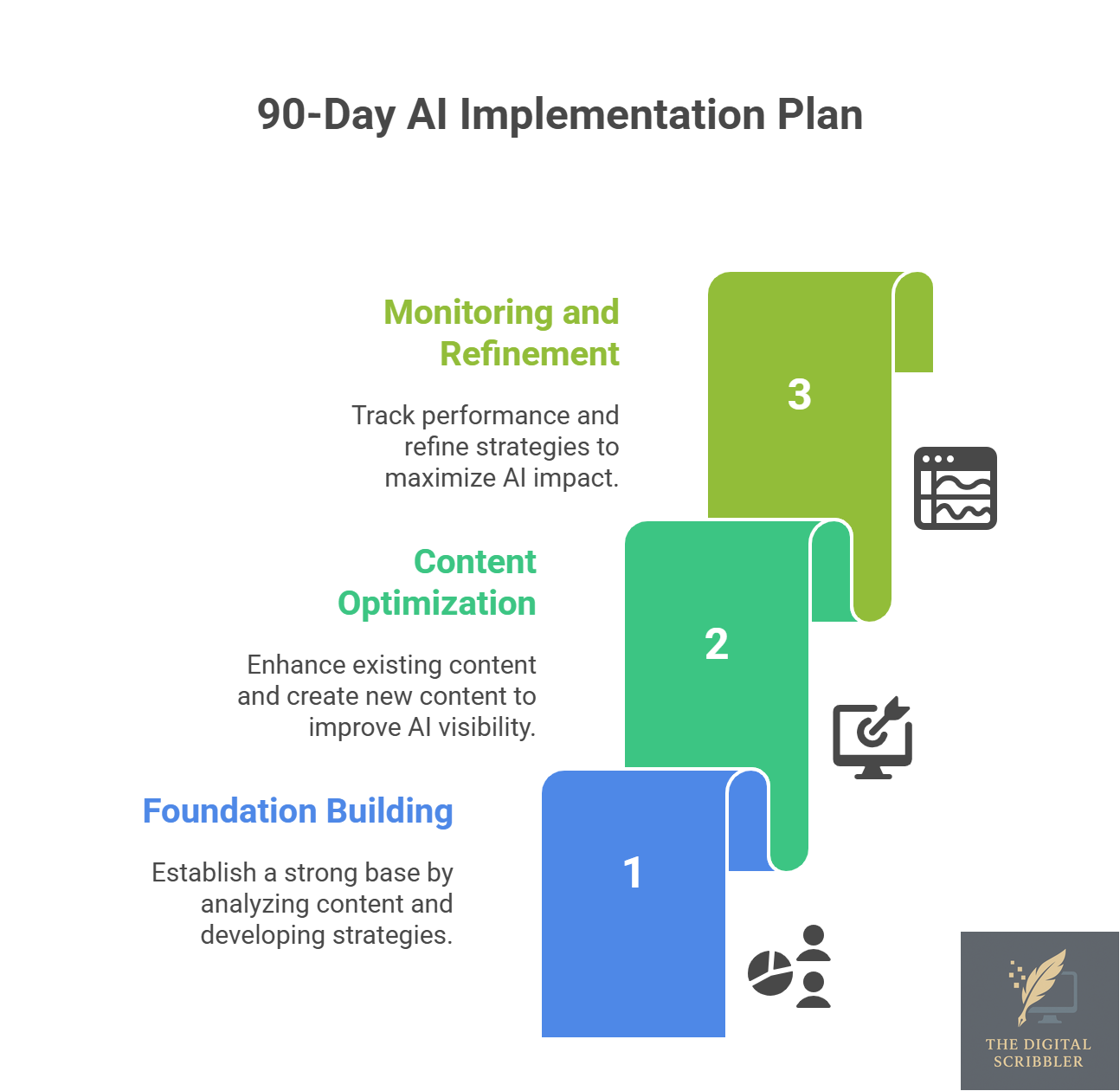AI Overviews vs. Traditional SEO: How to Future-Proof Your Content Strategy in 2025
Learn how Google's AI Overviews are changing SEO forever. Discover data-driven strategies to adapt your content for AI-powered search results and maintain organic traffic in 2025.
Three months ago, Sarah, a content marketing manager at a mid-sized SaaS company, watched her organic traffic drop by 23% overnight.
The culprit? Google's AI Overviews…
How, you ask?
Well, Google AI Overviews had started answering her target keywords directly in search results, leaving users with no reason to click through to her carefully crafted blog posts.
This isn’t just about Sarah, but applies to all creators out there in today’s time.
Semrush’s latest study reports:
This 2X growth in just two months signals how we are fundamentally shifting our approach towards traditional SEO…
What’s more interesting is the fact that:
Nearly 58% of Google searches now result in zero clicks.
Hence, smart content creators like you need to find new ways to sustain this landscape. To successfully do so, you must understand that:-
Traditional SEO isn’t dead — it’s evolving.
The Current State of AI Overviews: What the Numbers Tell Us?
Before I dive into the details, please remember:
Google AI Overviews are no longer an experiment, but are rapidly changing the entire landscape.
The Rising Dominance of AI-Powered Search Results
The statistics paint a clear picture of transformation:
47% of marketers are already implementing AI SEO tools to improve search efficiency, with another 84% using them to identify emerging search trends
AI Overviews drive over a 10% increase in usage of Google for queries that show AI Overviews in major markets like the US and India.
Healthcare and education queries are approaching 90% coverage by AI Overviews, while ecommerce queries still rarely show them.
But what surprises me more is this: ⬇️
It’s not just about losing traffic, but more about how user behavior is rapidly shifting.
The Zero-Click Reality: Understanding User Intent in 2025
When Rachel, a digital marketing consultant, first heard about the "zero-click" phenomenon, she panicked. Her blog traffic dropped by approximately 15% over six months, and she couldn’t understand why her optimized content wasn’t performing as expected.
When she dug deeper, she was amazed to see that Google’s AI Overviews were one step ahead of her, providing detailed responses to her target audience without requiring any clicks.
In simple terms:
Traditional metrics like click-through rates were no longer proving useful.
As per Ahrefs’ latest study, AI Overviews Reduce Clicks by 34.5%.
Here's what the data reveals:
Expert blogs and in-depth technical sites see their visibility increase by 15 to 45% because AI favors documented expertise.
Digital marketing and SEO-related topics may drive more visitors from AI search than traditional search by early 2028
Why Traditional SEO Strategies Are Becoming Obsolete
Do you remember the old SEO playbook with 3 golden rules:
Keyword Stuffing
Meta Tag Optimization
Link Building
It’s outdated and no longer works. Here’s why:
The Shift from Traffic Metrics to Conversion Quality
You remember the times when Traditional SEO was all about driving traffic volume to your website/blog and the number of clicks?
However, that strategy no longer works in 2025, as AI Overviews are changing the equation entirely.
Consider this scenario: You search for
the best project management software for small teams.
Earlier, you would need to click through multiple articles, invest time to compare features, and then make a decision.
Now, with Google’s AI Overview, you get a comprehensive comparison, complete with pros, cons, and recommendations, right at the top before SERPs kick in..
The result?
Fewer clicks, but higher-quality traffic.
However, if you do click through on any of the listed SERP results, you have already dived in and are further along in your decision-making process.
The Expertise vs. Volume Dilemma
Are you also focused on producing high volumes of content rather than focusing on showing your expertise?
Oh well, you’re way behind, like many other content creators out there, and are getting it all wrong.
Remember the famous E-E-A-T framework?
The acronym stands for “Experience, Expertise, Authoritativeness, and Trustworthiness” and has been a key component of Google’s Search Quality Rater Guidelines to evaluate content’s overall quality and credibility.
Even the data supports this shift:
64.48% of SEO experts prioritize the accuracy of AI tools over other factors when selecting them
75% of businesses report that AI-powered tools save up to 50% of time spent on data analysis and interpretation
90% of content marketers plan to use AI to support content marketing efforts in 2025, up from 83.2% in 2024
So, if you’re too focused on quantity over quality, it’s high time you move on and create content that addresses your target audience’s queries in the best possible manner.
Check Out This Article: Fundamentals to Create Helpful, People-First Content
The New SEO Paradigm: Optimizing for AI Understanding
So, the pressing question remains - how do you adapt to this change?
The answer is simple - you must understand how AI interprets and processes your content.
Creating Content That AI Can Understand and Recommend
Organic traffic is taking a hit and dropping everywhere.
In the words of Leigh McKenzie & Shannon Willoby,
Large language models (LLMs) are now answering your audience’s questions directly, quietly hijacking the clicks you used to count on.
Most agencies and corporations across the world are now struggling with declining organic visibility. They are ensuring their content is well-written and informative, addressing customer queries, yet they fail to see the results they desire.
Can you guess why? It’s because:
The content wasn’t structured for AI consumption.
So, if you’re also facing this issue for your content, make these three subtle but critical changes today: ⬇️
Enhance structured data implementation to help AI understand content context
Improve content depth and expertise signals through author credentials and comprehensive coverage
Focus on user intent rather than keyword density to align with AI's understanding of search queries
With these actionable tips, you will start seeing positive results over time, and your content will start appearing in AI Overviews.
You Must Also Read: Strategies to Ensure Your Content Performs Well in Google’s AI Experiences
The EEAT Framework in the Age of AI
Just above, I spoke about Google’s E-E-A-T framework, and with AI seeping into our daily lifestyle, it’s now becoming more critical.
Here's how you implement it effectively:
Experience: Share real-world examples and case studies. AI algorithms can identify and value firsthand experience.
Expertise: Demonstrate deep knowledge through comprehensive coverage of topics. Surface-level content gets filtered out.
Authoritativeness: Build your reputation through consistent, high-quality content and industry recognition.
Trustworthiness: Ensure accuracy, cite credible sources, and maintain transparency in your content creation process.
Practical Strategies for AI-Optimized Content Creation
Creating new content isn’t challenging. In my 10+ years of experience, what I have seen creators struggling with more is:
Devising a content strategy that aligns with your goals and works
So, if you’re new to the industry, here are the 3 best actionable strategies that work in 2025:
Here’s the breakdown:
The Content Depth Strategy
Instead of creating 10 shallow articles, you must focus on creating 2-3 comprehensive and well-researched pieces that thoroughly cover a topic.
Here's why this works:
AI algorithms favor comprehensive content that addresses multiple aspects of a topic
Users prefer detailed answers that eliminate the need to visit multiple sources
Search engines reward content that demonstrates subject matter expertise
Optimizing for Featured Snippets and AI Overviews
Are you trying to optimize your content, but don’t know how?
After analyzing over 1000+ results appearing in AI Overviews, here’s what I recommend everyone as the key optimization techniques:
Structure your content with clear hierarchies:
Use descriptive headings that answer specific questions
Intermix bullet points and short paragraphs for easy scanning
Provide clear, concise answers to common questions
Focus on question-based content:
Research the "People Also Ask" section (on Google SERPs) to get the list of questions related to your topic
Create dedicated sections answering these questions
Use conversational language that matches search queries and avoid using complex vocabulary
Implement schema markup:
Use structured data to help AI understand your content
Include the FAQ schema for question-based content
Implement article schema for blog posts and guides
The Human-AI Collaboration Approach
Remember: The most successful content creators in 2025 aren't replacing human creativity with AI—they're combining both strategically.
Here's a simple 4-step framework that's working for most of them out there:
Using AI for research and ideation
Applying human expertise for strategy and storytelling
Using AI for content optimization and distribution
Infusing AI content with your personalized touch to maintain quality
Tools and Technologies for the New SEO Landscape
In today’s AI era, every day, a new AI tool comes into the limelight, making it tricky for anyone like you and me to make a choice.
But, based on my years of industry experience and daily usage of AI tools, here’s what you can pick and make a difference:
Essential AI SEO Tools for 2025
Based on current industry usage, here are the tools that are making the biggest impact:
Content Creation and Optimization:
ChatGPT - Used by almost 65% of marketers and 44% of content creators for ideation and drafting
Semrush - For AI-powered keyword research and content optimization
Surfer SEO - For content optimization based on AI analysis
Performance Monitoring:
Google Search Console - To track AI Overview appearances
BrightEdge - For comprehensive AI impact analysis
Ahrefs - For tracking changes in search visibility
Measuring Success in the AI Era
As I stated at the start of my article:
Traditional metrics like organic traffic and keyword rankings are still important, but they're no longer the complete picture.
So, here’s what you should start tracking:
New Metrics to Monitor:
AI Overview appearances for your target keywords
Featured snippet captures
Content engagement depth (time on page, scroll depth)
Conversion rates from organic traffic
Share of voice in AI-generated responses
Quality Indicators:
Brand mentions in AI Overviews
Authority signals (author credentials, expertise demonstrations)
User engagement metrics beyond clicks
Industry-Specific Adaptation Strategies
B2B SaaS and Technology
For B2B technology companies, the shift to AI Overviews presents unique challenges and opportunities:
Challenges:
Complex technical topics need nuanced explanations
Buying decisions require multiple touchpoints
Trust and credibility are paramount
Opportunities:
AI favors detailed, technical content
Expert-level content gets higher visibility
Educational content performs exceptionally well
Strategy: Focus on creating comprehensive guides, comparison articles, and case studies that demonstrate your organization’s deep product knowledge and industry expertise.
E-commerce and Retail
E-commerce queries still rarely show AI Overviews, but this is changing.
If you’re a content strategist/marketer/writer for an eCommerce brand, here's how you can prepare yourself :
Product Content Optimization:
Create detailed product descriptions with technical specifications
Include comparison charts and feature explanations
Optimize for voice search and conversational queries
Content Marketing Focus:
Develop buying guides and educational content
Create problem-solving content that addresses customer pain points
Build authority through expert reviews and recommendations
The nuances vary for each industry, but as content marketers, we must understand how and what works and doesn’t work in our favor.
Common Mistakes You Must Avoid in AI-Optimized SEO
The AI Content Generation Trap
Many content creators are making the mistake of relying too heavily on AI for content generation. While AI tools are powerful, they should augment human expertise, not replace it.
The Problem: Only 4% of respondents publish "pure" AI-generated content, yet many are using AI as a crutch rather than a tool.
The Solution: Use AI for research, ideation, and optimization, but let me reiterate,
Don’t forget to humanize and personalize your content
when it comes to strategy, creativity, and expertise.
Ignoring User Intent in Favor of AI Optimization
Another common mistake you might make unknowingly is optimizing the content purely for AI algorithms and LLMs, and sidelining your target audience’s requirements and experience.
But remember:
AI Overviews aim to satisfy user intent
Featured section prefers content that truly helps users
Technical optimization without value creation fails
Future-Proofing Your Content Strategy
Based on what I have been reading online and industry experience, plus thanks to the current trends and industry analysis, here are my predictions for 2026 and beyond:
Near-term (2025-2026):
AI Overviews will expand to more query types
Voice search integration will become more sophisticated
Personalization in AI responses will increase
Medium-term (2027-2028):
AI may become the primary search interface
Traditional search results may become secondary
Content creators will need to focus on AI-first strategies
Building an Adaptive Content Strategy
Please remember:
The key to long-term success lies in building adaptability into your content strategy.
So, here are the core principles and implementation framework that you can follow to build an adaptable content strategy…
Core Principles:
Focus on expertise over volume - Deep, authoritative content wins
Optimize for user intent - Understand what your users need
Embrace technology - Use AI tools correctly to enhance your creativity
Monitor and adapt - Stay current with algorithm changes and user behavior
Implementation Framework:
Conduct quarterly content audits
Track AI Overview appearances and adjust strategy
Invest in training your team on different AI tools and techniques
Focus on developing partnerships with AI technology providers
Taking Action: Your 90-Day Implementation Plan
Do you remember the phrase?
Action speaks louder than words
Well, it perfectly fits here…
Do you know why?
Since, in this section, I talk about my 90-day implementation plan that helped me make the best use of AI Overviews…
So, without further ado, let’s get into it right away:
Days 1-30: Foundation Building
Week 1-2: Audit and Assessment
Analyze your content’s current performance
Identify keywords that trigger AI Overviews
Assess their content depth and expertise signals
Week 3-4: Strategy Development
Define your target audience and understand their intent
Develop content pillars around expertise areas
Create AI optimization guidelines
Days 31-60: Content Optimization
Week 5-6: Content Enhancement
Optimize your existing high-performing content
Implement structured data markup
Enhance your author credentials and expertise signals
Week 7-8: New Content Creation
Develop comprehensive topic clusters
Create FAQ-style content answering your audience’s queries
Build authority through case studies and real-life examples
Days 61-90: Monitoring and Refinement
Week 9-10: Performance Analysis
Track AI Overview appearances
Monitor engagement metrics
Assess conversion rate changes
Week 11-12: Strategy Refinement
Adjust content based on performance data
Optimize underperforming content
Plan future content initiatives
Conclusion: Embracing the AI-Powered Future of SEO
The shift to AI-powered search isn't just a trend, but the new reality. It’s no more doubtful that:
Content creators who adapt their strategies to work with AI algorithms, rather than against them, will thrive in this environment.
Remember Sarah from the beginning of this article?
After implementing an AI-optimized content strategy, her organic traffic improved by nearly improved by 30% within 3 months.
What changed, you ask?
Well, she started creating quality content that aligned with her target audience’s requirements and answered their queries. Her content was easy to understand for both humans and AI…
Yes, you guessed it right — The future of SEO is changing and is no longer just choosing between traditional techniques and AI optimization…
It’s more about smartly combining both as a content creator/marketer and ensuring it serves your target users better than ever before.
Key Takeaways:
AI Overviews are growing rapidly and changing user behavior
Traditional SEO metrics need to be supplemented with new quality indicators
Content depth and expertise are more important than ever
Human creativity combined with AI tools creates the best results
Adaptability and continuous learning are essential for long-term success
Remember, the question isn't whether AI will change SEO, because it already has.
What you should instead be asking is:
Are you ready to evolve with it?
What key challenges did you encounter with AI Overviews? How are you making them work in your favor? Let’s discuss your challenges and experience in the comments below!



